Can You Get Married at Night? A Guide to Magical Evening Ceremonies
Have you ever dreamt of saying “I do” beneath a starlit sky, surrounded by the soft glow of candles? Getting married at night offers a magical and unique experience. Many couples are choosing evening ceremonies for their romantic ambiance and flexibility.
Imagine exchanging vows with twinkling stars above or under the gentle glow of decorative lights.
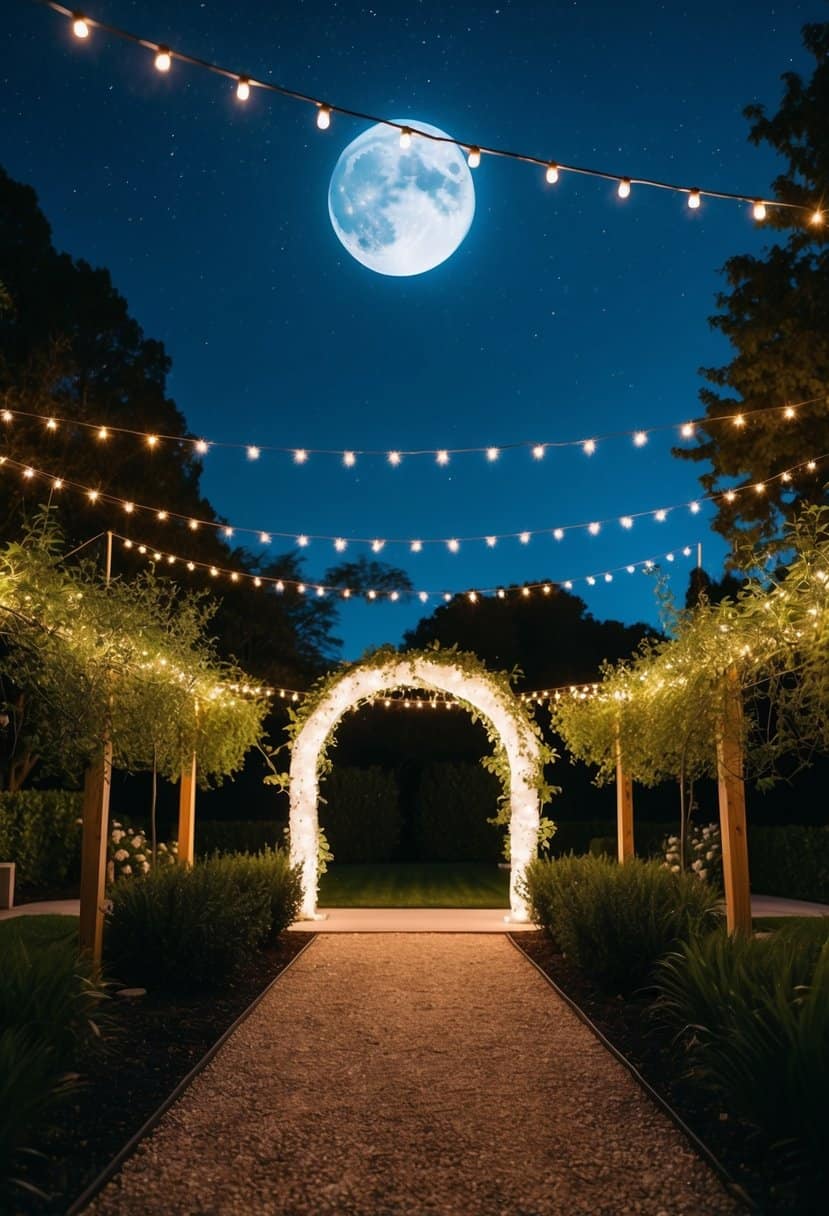
You can definitely get married at night. Whether it’s during twilight or beneath a moonlit sky, night weddings are becoming more popular. Planning a nighttime ceremony allows you to craft a celebration that feels uniquely yours.
The setting sun provides a backdrop for stunning photos, capturing a special moment in beautiful lighting.
By choosing an evening wedding, you can create memories that are both intimate and unforgettable. The atmosphere is naturally romantic, with opportunities to incorporate dazzling lights and creative themes.
As your guests arrive, they are greeted by a serene and enchanting environment, setting the tone for an extraordinary celebration.
Understanding Jewish Wedding Traditions
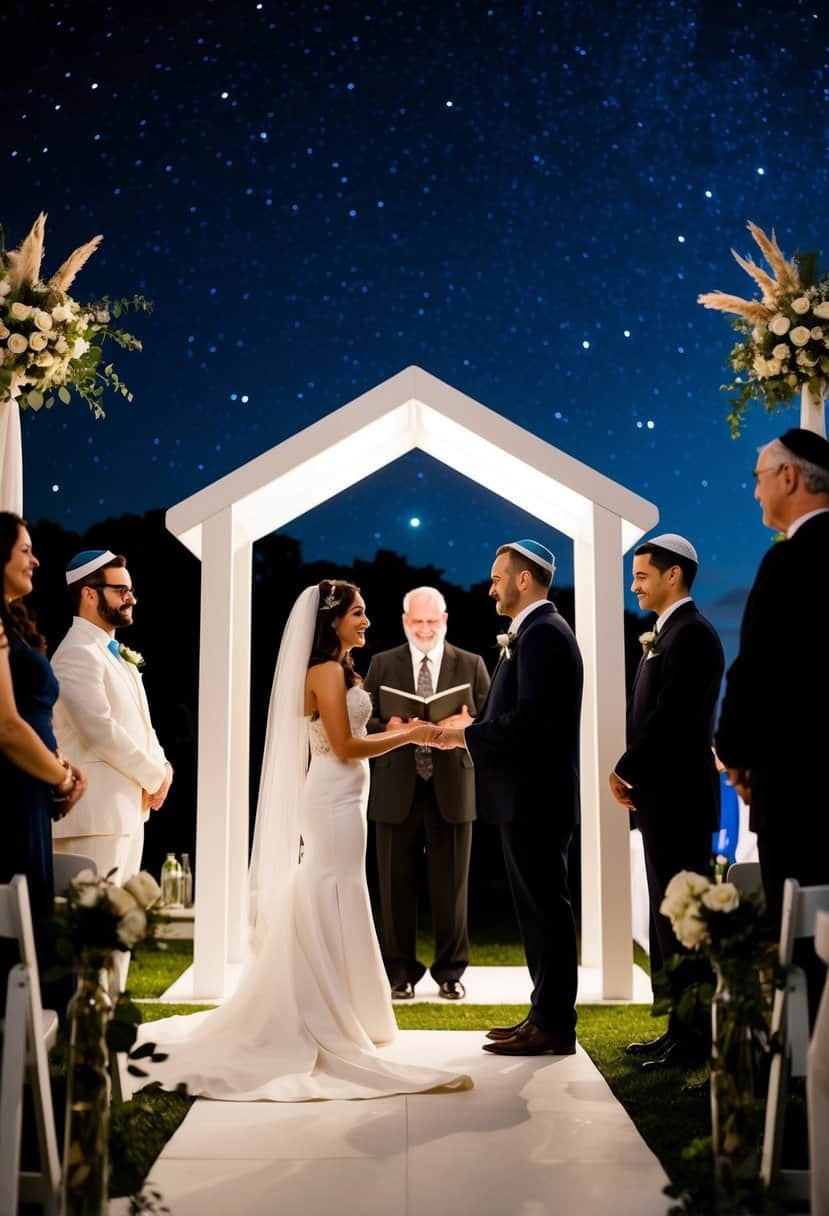
In Jewish weddings, traditions hold great importance. The time of the ceremony and the rituals performed have deep cultural and religious significance. Understanding these aspects helps you appreciate the rich heritage behind a Jewish wedding.
Significance of Time in Jewish Weddings
In Jewish culture, the timing of a wedding is carefully chosen. Weddings generally do not take place on Shabbat, which starts at sunset on Friday and ends at nightfall on Saturday. Similarly, weddings are avoided on Rosh Hashanah and Yom Kippur, as these are significant days of rest and reflection.
An important feature of Jewish weddings is factoring in the Jewish calendar. For instance, certain days like Lag BaOmer are popular for ceremonies.
Considerations about public mourning periods, such as the Omer, also affect the choice of wedding dates.
A wedding ceremony in the evening is generally possible but has to follow these key guidelines to respect cultural and religious customs.
Traditional Jewish Wedding Ceremonies
A traditional Jewish wedding is rich with customs and rituals. The ceremony usually starts with a ketubah signing. The ketubah is a marriage contract outlining the husband’s responsibilities toward his wife. This contract is both a legal and symbolic document in Jewish marriages.
During the ceremony, the couple stands under a chuppah, symbolizing the home they will build together. Breaking the glass is another famous ritual. It signifies the destruction of the Temple in Jerusalem and reminds couples of life’s imperfections.
Guests often shout “Mazel tov!” to the couple after the glass-breaking tradition. This joyful exclamation is an integral part of Jewish wedding celebrations. Each of these customs adds depth and meaning to the wedding, making it memorable and special.
Choosing the Right Date for Your Wedding
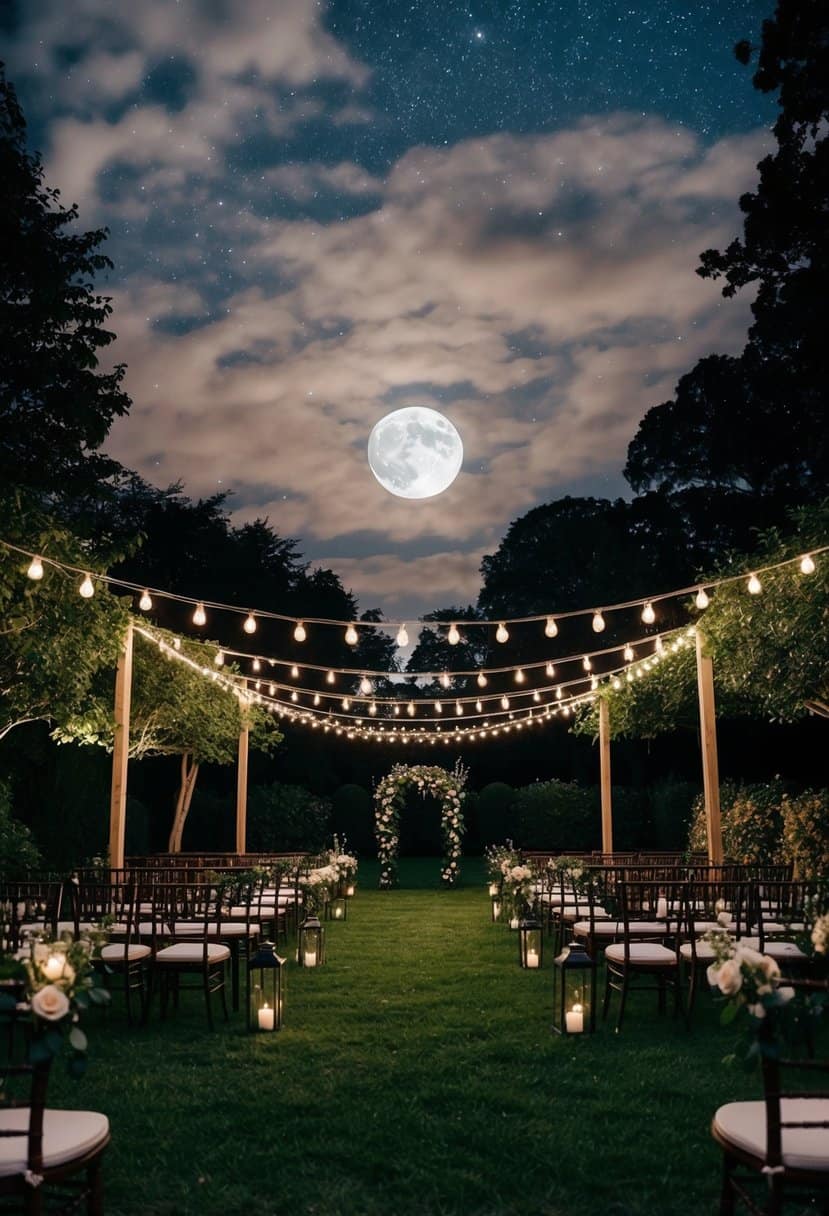
When selecting a wedding date, consider both cultural and personal preferences. Some traditions and holidays in the Jewish calendar may influence your decision.
Additionally, think about other key days that could impact your celebration.
Navigating the Jewish Calendar
The Jewish calendar includes several important days that could affect your choice. For instance, weddings are generally not held on major holidays like Passover or during Shavuot.
It’s also traditional to avoid getting married on fast days such as Tisha B’Av and the 17th of Tammuz.
Certain periods are more festive and may be suitable for weddings. For example, while the Three Weeks leading up to the 9th of Av are a time of mourning, Hanukkah and Purim are often considered more joyous. Yet, weddings are usually discouraged during the Counting of the Omer, except for Lag B’Omer, which is a day of celebration.
Important Dates to Consider
When choosing your wedding date, think about days that hold personal significance for you and your partner. Popular choices include dates with repeating numbers or anniversaries of meaningful events in your relationship.
Consider practical aspects such as weather and venue availability as well.
Certain weekends or holidays may be ideal for guests who have to travel, while others, like labor-intensive weekends, might complicate plans. Special dates can add an extra layer of significance to your celebration, making it memorable for both you and your guests.
Nighttime Wedding Ceremonies

Nighttime weddings offer a unique and magical experience. They require thoughtful planning around practical needs such as the event’s timing and lighting to create a memorable atmosphere. Below, you’ll find important details on how to manage these aspects effectively.
Logistics of an Evening Wedding
When planning an evening wedding, timing is key. Starting after dark can offer a romantic vibe but requires coordination.
You might choose to have a twilight ceremony to still capture some natural light for photos.
Think about your guests’ comfort. Your ceremony and reception should flow efficiently. Transportation may need adjustment, especially for guests traveling longer distances.
Consider the lighting at your venue. While the stars and moon provide ambiance, more is often needed to ensure guests’ safety and visible photography.
For rural or dimly lit venues, portable lighting solutions can be a practical addition.
Lighting and Atmosphere
Creating the perfect atmosphere relies heavily on lighting. Proper illumination not only enhances safety but also highlights your attire and decor.
String lights, lanterns, and candles can provide romantic, warm lighting.
For outdoor or darker venues, various lighting options can help bring your vision to life. Uplighting around the venue’s perimeter adds warmth, while fairy lights create a whimsical feel.
Ensure lighting is both functional and decorative.
If your venue is mainly indoors, soft LED lighting might work best to highlight features without being too harsh.
Consider visiting your venue at night beforehand to envision the setup. Luxurious evening weddings can truly shine with the right lighting plan in place.
Planning Your Wedding Venue and Services
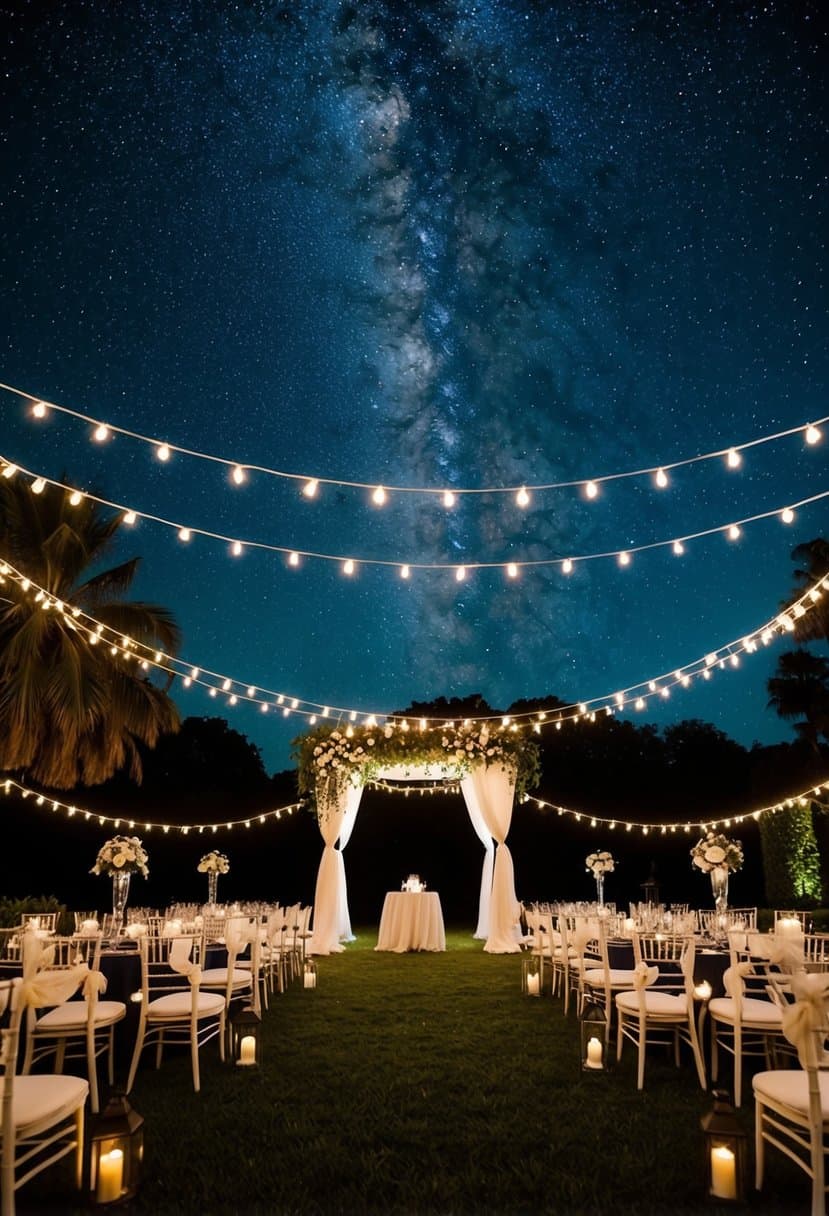
When planning a wedding, selecting the right venue and coordinating with vendors are crucial, especially for a night event. Consider the unique aspects of a nighttime wedding to ensure your celebration is both beautiful and seamless.
Evaluating Venue Options
Choosing a venue for a night wedding requires attention to lighting and ambiance. A well-lit space is essential for safety and to showcase the beauty of the event.
If your chosen venue lacks natural illumination, look into additional lighting options like string lights, lanterns, or spotlights.
Consider venues that offer indoor and outdoor spaces to provide flexibility in case of weather changes.
Visit potential venues at the same time your wedding will take place to get a real sense of how the lighting will enhance the atmosphere.
It’s also important to ask about any restrictions related to sound and lighting equipment to ensure everything aligns with your vision.
Coordinating with Vendors for a Night Event
Working closely with vendors is key when planning a night wedding. Communicate the timing and lighting needs clearly, as these differ from daytime events.
Highlight the importance of lighting for photographers, caterers, and musicians so they can prepare accordingly.
Create a detailed schedule to share with your vendors, including setup and teardown times. This ensures a seamless flow on your big day.
Consider hiring a wedding planner to help coordinate with vendors and confirm all service providers are well-prepared for the evening. Having a single point of contact will reduce stress and ensure nothing is overlooked.
Cultural Considerations and Adaptations
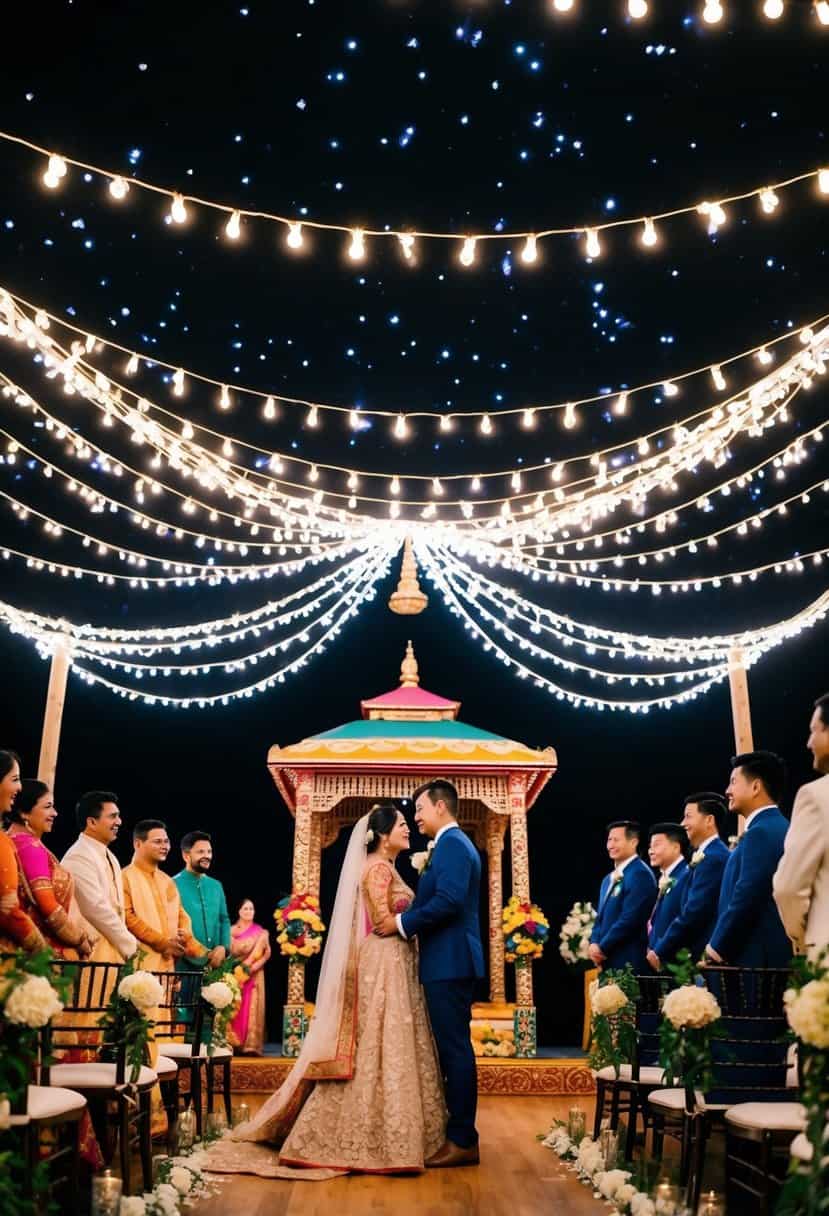
When planning a nighttime wedding, cultural traditions can play a big role. Some cultures have specific rules about when you can get married.
Sukkot is a Jewish festival that lasts for a week. You might find it meaningful to have your wedding under a decorated booth or tent. Night weddings can add a festive and romantic atmosphere to this celebration.
Shabbat is another important time in Jewish tradition, occurring from Friday evening to Saturday evening. Marriages typically do not take place during Shabbat. However, a Saturday night wedding, after Shabbat ends, can be a beautiful option that respects religious customs.
In some cultures, the day and time of a wedding can be seen as auspicious or inauspicious. It’s important to talk to your family or religious leader to choose a time that reflects your cultural values.
Here’s a quick look at some cultural elements:
| Tradition | Night Wedding Consideration |
|---|---|
| Sukkot | Consider a wedding under a tent |
| Shabbat | Avoid until Saturday night |
When adjusting your plans, remember that some guests may have cultural expectations too. Make sure to explain any unique aspects of your night wedding.
Remember to celebrate and honor your culture while creating a special night to remember.


